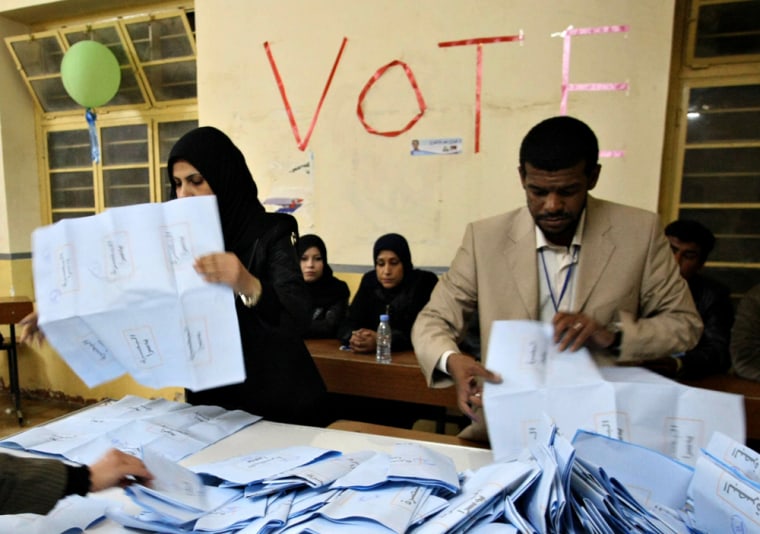Iraqis held their most peaceful election since the fall of Saddam Hussein on Saturday, and voting for provincial councils ended without a single major attack reported anywhere in the country.
"No security breaches took place during the election. Things went as we planned and as we hoped," Defense Ministry spokesman Major General Mohammed al-Askary said.
"I consider it a great success, like a wedding."
President Barack Obama congratulated Iraqis on the election and urged the winners to work for their people.
"Millions of Iraqi citizens from every ethnic and religious group went peacefully to the polls across the country to choose new provincial councils," Obama said in a statement released by the White House. "It is important that the councils get seated, select new governors and begin work on behalf of the Iraqi people who elected them."
Obama also noted that the U.S. provided technical assistance to the Iraqi electoral commission, as did the U.N. and other international groups.
The elections were conducted without major violence. In the only reported incidents countrywide, mortar rounds landed in former dictator Saddam Hussein's hometown of Tikrit but no one was hurt, and Iraqi troops shot one person dead and wounded another after a quarrel in Baghdad's Sadr City slum.
Missing namesBut election observers and others were examining a growing list of complaints, including claims that hundreds of people — perhaps more — were wrongly omitted from voting lists in areas across Iraq.
"There was huge amount of confusion," said Afram Yakoub, a Belgium-based election monitor who visited polling sites in the Mosul area in northern Iraq. "Names were on the center voter registry but did not appear on the (polling) station registry."
The leader of the second largest Sunni bloc in parliament, Saleh al-Mutlaq, accused the Shiite-led government of a deliberate campaign to keep the minority Sunnis "on the sidelines."
It was unclear whether the alleged problems were isolated or could cast doubts on the entire election.
Any political bitterness could further complicate another difficult task ahead for Iraq's leaders: getting hundreds of factions to accept the results as credible and then start hammering out alliances from among 14,000 candidates for the influential regional posts.
The overall picture, however, was close to the goals set by Iraqi officials desperate to portray a sense of order and confidence nearly six years after the U.S.-led invasion.
Iraqi forces are determined to show they can keep security in the country as U.S. troops begin to withdraw almost six years after the invasion to overthrow Saddam.
Prime Minister Nuri al-Maliki is looking to use the election to build his own power base in the provinces before national polls later this year. Sunni Arab groups who boycotted the last provincial polls are hoping to win a share of local power.
There was something of a holiday atmosphere in many parts of the country. In normally traffic-choked Baghdad, children took advantage of a ban on cars to play soccer in the streets.
"How can we not vote? All of us here have always complained about being oppressed and not having a leader who represented us. Now is our chance," said Basra voter Abdul Hussein Nuri.
'Picture of trust'The last election took place amid an al-Qaida-inspired Sunni insurgency and was followed by a surge in sectarian slaughter between once dominant Sunni Arabs and majority Shiite Muslims.
That violence has dropped dramatically since 2007.
The 140,000 U.S. troops in Iraq had patrols on the streets and helicopters in the sky but mostly kept a low profile. A U.S. armored column was seen weaving down a Baghdad street between children and rocks placed in the road as makeshift soccer goals.
Maliki, shadowed by a bodyguard, dipped his finger into an ink box after voting in the walled Green Zone enclave in Baghdad.
He appealed for a high turnout — which would help boost his government's attempts to use the election as a sign of progress.
"This gives a picture of trust in the government, the elections and the people's right to take part in this democratic process," he said.
At a polling station in a girls' primary school in Kerbala, women in black robes and husbands carrying small children packed into classrooms to cast their ballots, watched over by election monitors perched on tiny children's chairs.
Five candidates were assassinated in the run-up to the election — three of them just two days before the vote. But overall levels of violence remained low.
"The elections are not boycotted by any major community as has happened in the past," Andrew Gilmour, deputy head of the U.N. mission in Iraq, told Reuters. "Above all it means these councils should be able to deliver a level of services."
Just under 15 million of Iraq's 28 million people are registered to vote for provincial councils that select powerful regional governors. Three Kurdish provinces will vote separately and the election was indefinitely postponed in Kirkuk to avoid a showdown between Kurds and Arabs vying for control there.
Candidates are competing for 440 council seats after exuberant campaigning. Brightly colored campaign posters cover the blast walls that divide Iraqi neighborhoods.
Mobile phones across the country have beeped in unison this week as parties sent last-minute mass campaign text messages. Results are not expected before Tuesday.
More on
